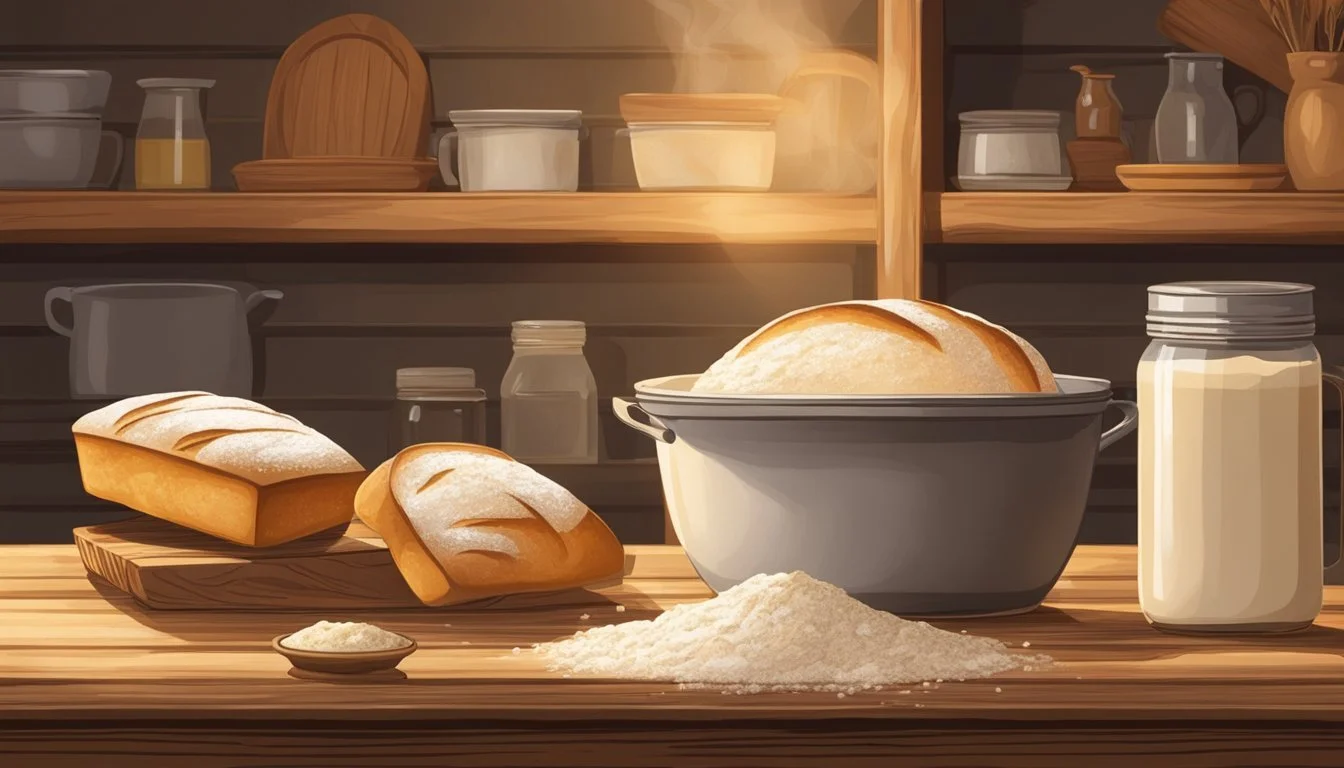Sourdough Bread and Mental Health
Unveiling the Psychological Rewards of Baking
The process of baking sourdough bread (What wine goes well with bread?) has been recognized not only as a culinary craft but also as a beneficial activity for mental health. Engaging in the creation of sourdough from scratch is a journey that encompasses the tactile experience of handling the dough and the patience required during the fermentation process. This mindful involvement offers therapeutic benefits, as it focuses the mind and provides a sense of accomplishment upon the completion of a tangible, nourishing product.
Sourdough bread, with its unique fermentation process, entails nurturing a live culture, which can foster a sense of connection and caretaking. This connection often extends beyond the baker to those who share in the consumption of the bread, enhancing social bonds and contributing to emotional well-being. The fermentation process itself is thought to improve the nutritional profile of the bread, making it a healthy choice for those who consume it.
Therapeutic benefits of baking, particularly sourdough bread, are increasingly being linked to positive mental health outcomes. The measured, deliberate actions required in baking can promote mindfulness, which has been shown to reduce stress and improve mood. These activities can serve as an informal form of therapy, providing an outlet for creativity and stress relief, while also resulting in a wholesome product that supports physical health.
The Science of Sourdough and Mental Well-Being
The alchemy of sourdough breadmaking extends beyond the kitchen, intertwining with mental well-being through its process and biological impact on the body. This section divulges its scientific correlation with mental health, focusing on the breadmaking process, gut-brain axis, and psychological benefits.
Exploring Sourdough Breadmaking
Sourdough involves a natural fermentation process using a symbiotic culture of yeast and lactic acid bacteria. This ancient art requires patience and precision as bakers mix, proof, and bake their way to the perfect loaf. Sourdough breadmaking is a tactile and enriching experience that demands attention to detail and a lightness of touch.
Gut Microbiome and Mental Health
The gut microbiome consists of a vast community of microorganisms, including bacteria, yeast, and viruses. Its composition affects various bodily functions, including the glycemic response and immune system. Increasing evidence supports the gut-brain axis concept, linking gut microbiota to mental health conditions like anxiety and depression. Eating sourdough can influence this axis and potentially have positive effects by altering the microbiota.
Psychological Effects of Baking Bread
Baking bread, particularly sourdough, is considered by some as a form of mindfulness, which can cultivate joy and mitigate feelings of anxiety and depression. The meditative rhythm of kneading dough and the satisfaction of creating a finished product from scratch can provide psychological relief and a sense of accomplishment.
Therapeutic Baking: A Path to Mindfulness and Stress Relief
Baking, especially in the context of sourdough bread, emerges as a potent form of therapeutic activity. It channels mindfulness and stress control, enhancing emotional well-being and self-care.
Mindfulness Through Measured Baking
Therapeutic baking requires attentiveness to each step, turning the kitchen into a haven for mindfulness practice. The process of measuring ingredients, kneading dough, and awaiting the rise demands a present focus that can displace the clutter of an anxious mind. Engaging the senses, the baker becomes grounded in the tactile experience, finding in the rhythm of kneading both a literal and metaphorical release of tension.
Stress Baking: Controlling Anxiety and Depression
The act of baking sourdough bread can also play a role in managing stress-related conditions such as anxiety and depression. The predictable routines and physical activity involved in baking are known to release endorphins, while the creative aspect of shaping loaves can impart a sense of control. By fostering a satisfying sense of accomplishment and providing a constructive outlet for emotions, baking encourages a positive mood shift and stress reduction.
The Role of Breadmaking in Self-Care Routines
Integrating breadmaking into one's self-care routine offers a chance to pause and reflect. Sourdough breadmaking, with its slow fermentation, provides time to practice patience and self-reflection. It places value on the act of caring for something from start to finish, reinforcing the importance of nurturing oneself similarly. Furthermore, sharing the final product enhances social bonds and a sense of community, integral to emotional well-being.
Ingredients and Processes: A Deeper Connection
In sourdough bread baking—the careful selection of ingredients and the transformative steps involved aren't just acts of creating food; they are deeply nourishing practices that engage the mind and can contribute to mental well-being.
The Art of Choosing Ingredients
The journey begins with the selection of ingredients, a task that involves attentiveness and a connection to the earth's bounty. High-quality flour is fundamental; often, bakers prefer bread flour due to its higher protein content, which is key for gluten development. Water activates the flour's gluten-forming proteins, and its temperature can affect the rate of fermentation—a process integral to sourdough's unique qualities. Bakers must choose their ingredients mindfully, as each has a role to play in the bread's flavor and texture.
Flour: Often bread flour for its high protein.
Water: Temperature-controlled for fermentation.
The Transformational Process of Baking
The heart of sourdough baking lies in fermentation, a transformation guided by a starter, a mixture of flour and water inhabited by wild yeast and bacteria. This living entity is what makes sourdough bread a transformative experience for both the baker and the dough. As bakers mix, knead, and shape their dough, they experience a physical connection to the ingredients. The dough rises and changes, a metaphor for growth and patience. The baking process itself thus becomes a gesture of care, from nurturer to nourishing product, offering a therapeutic benefit to the baker as much as the final bread does to those who enjoy it.
Starter: A key element introducing wild yeasts and beneficial bacteria.
Fermentation: The alchemical process that converts flour and water into a complex, flavorful bread.
The Social and Sensory Experience of Baking
Baking sourdough bread offers multi-sensory enjoyment and fosters community connections, providing joy through hands-on activities such as kneading and shaping, coupled with the delightful aromas from the oven.
Bonding Over Bread: The Community Aspect
In the community-oriented practice of sourdough baking, individuals come together to share recipes, tips, and the final product, fostering a sense of belonging. Community kitchens or baking clubs often serve as meeting points where novices and experienced bakers alike exchange stories and kneading techniques, strengthening community ties. This communal aspect not only disseminates baking knowledge but also supports emotional wellbeing by creating spaces for social interaction.
Share and Learn: Exchange of sourdough starters and techniques.
Bake Together: Group baking sessions enhance skills and relationships.
Stimulating the Senses: Visibility, Aroma, and Touch
The sensory experience of baking sourdough bread is rich and engaging, from the tactile pleasure of kneading dough to the visual transformation during shaping and the enticing aroma emanating from the oven. Each stage of the baking process stimulates the senses and can instill a sense of accomplishment and joy.
Sight: Observing dough rise and take shape.
Smell: The comforting scent of baking bread.
Touch: The therapeutic motions of kneading and shaping dough.
These sensory experiences often evoke memories and emotions, making sourdough baking not just an act of creating food but an enjoyable and fun journey that captivates bakers, strengthening their connection to their senses and to each other.
Sourdough as a Creative Outlet and Skill Development
Baking sourdough bread is an intricate process that engages individuals in the expansive realms of creativity and skill mastering. This craft requires focus and patience, offering a meditative quality that contributes to personal growth.
Fostering Creativity and Personal Growth
The act of creating sourdough from scratch is a unique form of expression. Individuals select their ingredients and integrate them through techniques that often turn into a personal signature. Creativity flourishes as they experiment with different flours, hydration levels, and folding techniques. The practice is not just about following instructions; it involves a journey of personal growth where bakers learn to trust their intuition and embrace the variability of results. This often leads to a deep satisfaction in their ability to produce something both beautiful and edible—a loaf of bread that is entirely their own creation.
Skill Enhancement and Providing Guidance
Developing the skills to bake sourdough does not happen overnight. It takes time and patience, testing one's ability to maintain focus over extended periods. The repetitive actions of kneading, shaping, and scoring the dough serve as a form of meditation, centering the mind and fostering a sense of calm. It is critical for beginners to seek guidance from more experienced bakers or thorough resources to build their competence in this craft. As they refine their techniques, the skills acquired can translate to other areas of life, requiring precise handwork and attention to detail. The progress is tangible, often seen in the improved texture and taste of the bread, leading to a feeling of accomplishment and skill enhancement.
Health Benefits Beyond Mental Health
While the act of baking sourdough can be a therapeutic process beneficial for mental health, the bread itself offers several physical health advantages. These benefits are rooted in its unique ingredients and fermentation process.
Dietary Impact of Sourdough on Physical Health
Sourdough Bread is not merely a delicious bakery staple, it has several dietary benefits that contribute to physical health. The long fermentation process that characterizes sourdough production allows for the growth of Lactic Acid Bacteria, which can positively affect digestive health. During fermentation, these bacteria help to break down the phytates found in flour, which can improve the bioavailability of minerals and reduce Phytic Acid, which is known to inhibit mineral absorption.
Moreover, the organic acids produced during fermentation might help to slow down the bread's Glycemic Index (GI), possibly improving glycemic control and enhancing Satiety after consumption. Compared to other types of bread, the lower GI of sourdough may prevent a rapid spike in blood sugar levels, offering a more stable and sustained release of energy.
Managing Dietary Concerns: Gluten Sensitivity and Beyond
For individuals with certain dietary concerns, such as Gluten Sensitivity or Irritable Bowel Syndrome (IBS), sourdough may represent a more suitable option compared to standard wheat bread. The fermentation process is believed to modify gluten to some extent, which might reduce gluten’s effects on individuals with Wheat Sensitivity.
Nevertheless, it is important to note that sourdough bread is not Gluten-Free Bread, and those with celiac disease should avoid its consumption. However, for people sensitive to Fodmaps—short-chain carbohydrates that can cause digestive distress—sourdough’s fermentation reduces Fodmap levels, thereby potentially mitigating IBS symptoms.
The aforementioned benefits show that sourdough's influence extends beyond the kitchen and into many facets of physical health, reflecting in various biochemical improvements during In Vitro Digestion and offering diverse dietary advantages.
Incorporating Sourdough Baking Into Your Routine
Incorporating sourdough baking into one's daily life can serve as a grounding practice that enhances well-being and complements other therapeutic activities.
Building Routines Around Breadmaking
Creating a schedule that includes sourdough baking can instill a sense of routine and purpose. A person may start by designating a specific time each day or week to the practice of breadmaking, turning it into a ritual that fosters focus and presence. For enhanced sleep quality, engaging in this calming activity in the late afternoon can help wind down the day, setting the stage for restfulness. To incorporate baking into one's routine:
Morning: Align the initial steps of sourdough preparation with breakfast, setting intentions for the day.
Afternoon: Use the breadmaking steps as breaks between work tasks to rejuvenate the mind and boost happiness.
Evening: Shape and bake the dough; the warm, ambient scent contributes to a comfortable and soothing environment for relaxation.
Integrating Baking with Other Therapeutic Activities
Sourdough baking can be seamlessly integrated with other therapeutic activities such as running, yoga, or any exercising regimen, complementing these activities and further promoting mental health. For example:
After a yoga session, one might find the rhythmic motion of kneading dough a continuation of the meditative state achieved during practice.
Following a run, the focused task of bread scoring can be a form of mindfulness, helping to transition from the high energy of exercising to a more reflective state.
Talking therapies can be complemented with discussions around the experiences of baking, as the breadmaking process may surface insights useful in therapy sessions.
By weaving sourdough baking with existing wellness practices, individuals enrich their routines, creating a holistic tapestry that supports their mental well-being.
Conclusion: Embracing Imperfection and The Journey
The art of baking sourdough bread serves not just as a culinary skill, but as a conduit to improved mental well-being. It underscores the importance of accepting imperfection and appreciating the process.
The Psychological Reward of Baking
Baking sourdough bread offers a psychological reward unmatched by many other activities. It grounds individuals in the present, requiring focus and physical involvement, leading to increased awareness in their actions. The therapeutic benefits of bread-making are comparable to mindfulness exercises; each precise measurement and knead of the dough immerses the baker in a therapeutic process. Pauline Beaumont, a staunch advocate of 'bread therapy', has asserted that baking often aids in relieving feelings of anxiety and provides a sense of accomplishment, nurturing one's mental well-being when bread emerges beautifully from the oven. Imperfections in the baking process, like a loaf that hasn’t risen perfectly, serve to remind that there is beauty and lessons in flaws, which parallels life’s unpredictable nature.
Beyond Bread: Lifelong Benefits of Baking
The experiences gathered from baking transcend far beyond the kitchen. When individuals bake, they are not merely creating bread; they are cultivating life skills--patience, precision, and the ability to handle unexpected outcomes with grace. These learned behaviors can have lasting effects on one's personal and professional spheres. The physicality of kneading dough also presents a subtle but beneficial form of exercise, which further contributes to one's overall mental and physical well-being. In the journey of bread-making, every bowl of dough tells a unique story—a story where imperfection and process are central to personal growth and self-reflection.






